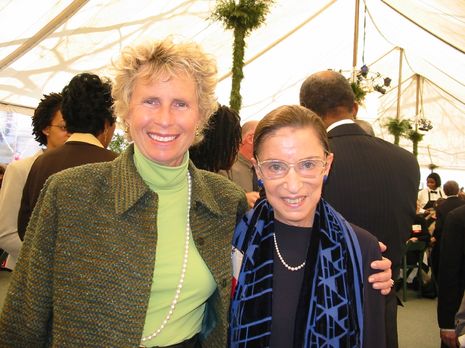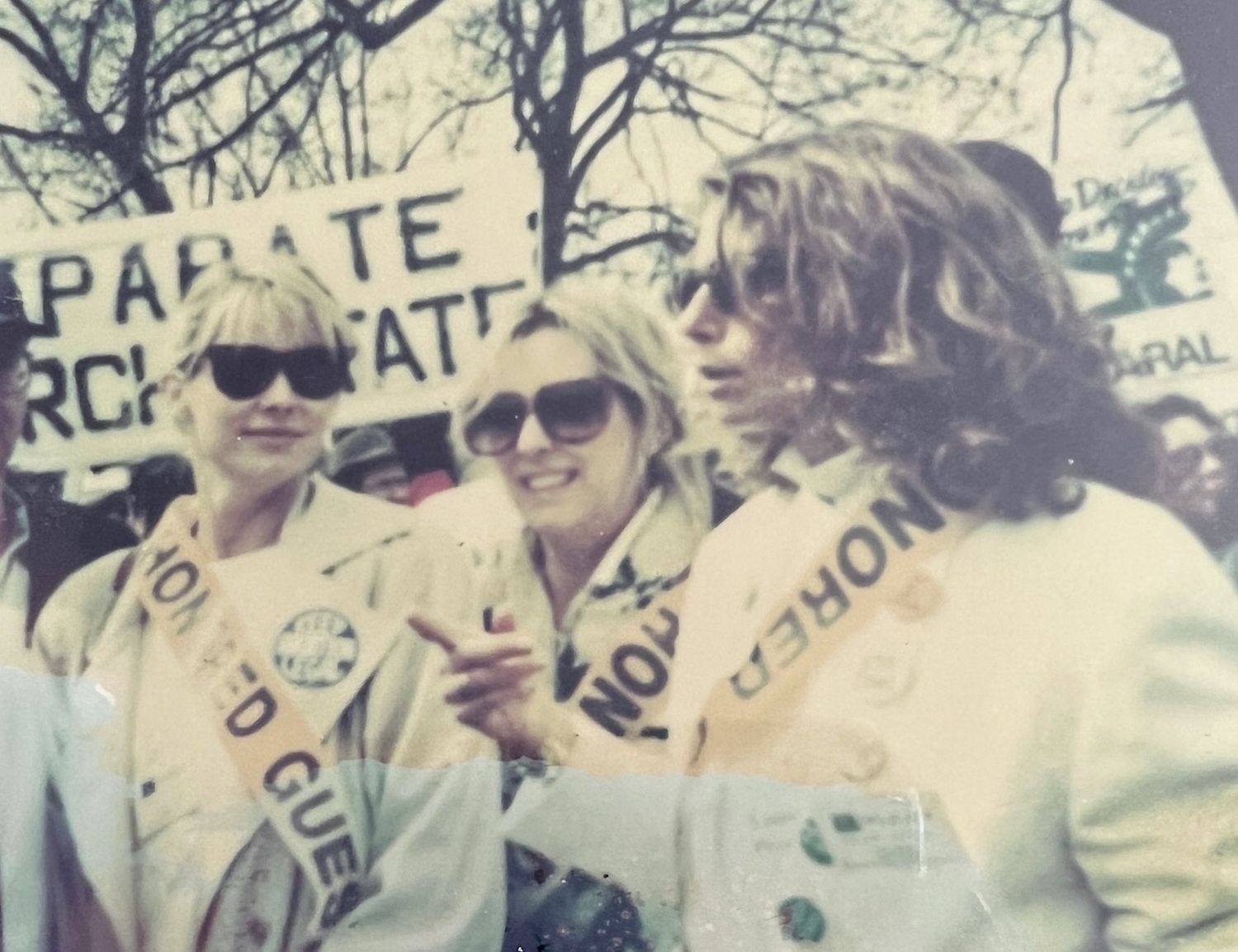With the rise of second wave feminism in 1960s and 70s America, legal inequalities, sexuality, and reproductive rights became the focus of the women’s movement. As a Harvard educated lawyer and one of the leading feminist figures of this time, Brenda Feigen’s work encompassed all of these priorities. From bringing the first sex discrimination cases to the US Supreme Court with Ruth Bader Ginsburg, to founding the first American national feminist magazine with Gloria Steinem, and vocally campaigning for the adoption of the Equal Rights Amendment, Brenda Feigen was a key driver of this fight for gender equality.
“There was a sign saying ‘No Ladies Allowed’”
In Feigen’s class at Harvard Law School in the late 1960s, where only 6% were women, she recalls: “it was amazing that I survived, because it was the most sexist place — you cannot even imagine.” At Harvard, women were banned from using the squash courts, all students were addressed as “gentlemen”, and professors created designated ‘Ladies’ Days’, “where, for example, in criminal law the professor would call on women to talk about how much penetration constitutes rape.” Feigen characterises her experiences at Harvard as “the very beginning” of her lifelong commitment to the women’s movement.
Having married during her time at Harvard in 1968 at the Harvard Club in New York, Feigen remembers that on the library door “there was a sign saying ‘No Ladies Allowed’”. She proudly tells me that five years later “I was one of the lawyers to bring a class action lawsuit against the Harvard Club in 1973, and we won — they couldn’t carry on only being men.”
However, when starting to find work as a lawyer there was clear discrimination against women: “One of the firms told me they had already hired their one woman for the year. Another wouldn’t consider me because they were thinking about my husband.”
After graduating from Harvard in 1969, Feigen became the National Legislative Vice President of the National Organization for Women (NOW); she outlines their two big priorities at the time: “abortion and the Equal Rights Amendment”. However, keen to “help women at the grassroots level”, Feigen teamed up with Gloria Steinem to found the Women’s Action Alliance and Ms. magazine, the first national feminist magazine in America, in 1971.
“It was just in the air that that amendment should be revived”
Shortly after the announcement of Ms. magazine, Feigen left to join then-Professor Ruth Bader Ginsburg as co-director of the newly forming Women’s Rights Project in the American Civil Liberties Union (ACLU). She describes their work together as “an amazing combination of our skills because she was such an extraordinary scholar of the Constitution and of Supreme Court cases […] and I was very much involved in the women’s movement.” Together they took the first sex discrimination cases to the Supreme Court level in the USA.
In 1974, Feigen left the Women’s Rights Project in order to focus on gathering support for the Equal Rights Amendment (ERA). The ERA, that would enshrine equal rights regardless of sex in the US Constitution, was first unsuccessfully presented to the US Congress in 1923 by Alice Paul and Crystal Eastman. In the 1970s, Feigen describes how “it was just in the air that that amendment should be revived.” Feigen had been actively involved in this revival, organising protests, raising money and writing the testimonies for herself and Gloria Steinem in support of the ERA in May 1970. Feigen took a very public role in this campaign: “I was the one on the stages of different universities and on different screens” debating the opponents of the ERA. The most infamous objector to the ERA was Phyllis Schlafly, who Feigen describes as “horrific” and “very, very disturbing”. The ERA was only ratified by 35 states by its extended deadline in 1982, just shy of the necessary 38 that would have enabled it to become an amendment to the Constitution.

Mrs. America, the 2020 critically acclaimed and Emmy nominated mini-series, starring the likes of Cate Blanchett and Elizabeth Banks, explores the fight to pass the Equal Rights Amendment. In this series, Feigen is depicted as one of the leading second-wave feminists in America, which she takes as “a compliment.” Despite believing the series to be “a positive statement about our movement”, and praising the actor who played her, Ari Graynor, as “terrific”, Feigen tells me that “they took my book, Not One of the Boys: Living Life as a Feminist […] as the spine of their story through the entire thing and they did not get my permission.”
“Who are making these laws? It’s men and they just want to continue to control women”
In the last decade there has been a new wave of support for the adoption of the ERA, with Nevada ratifying the amendment in 2017, Illinois in 2018, and Virginia following in 2020. Feigen attributes this renewed interest to “a surge in feminism”, particularly due to the #MeToo movement and the election of President Donald Trump in 2016. Feigen admits that despite wanting the ERA “symbolically and politically”, she prefers the majority opinion given by Ruth Bader Ginsburg in the 1996 Supreme Court case, United States v. Virginia. This case ended the male-only admission to the Virginia Military Institute and laid the precedent that there had to be “exceedingly persuasive justification” for discrimination on the basis of sex henceforth. This means that rather than having “an absolute fundamental equality” as stipulated by the ERA, initiatives such as affirmative action programmes for girls and women can still exist, which would otherwise “be gone under the Equal Rights Amendment as you can’t prefer a sex.”
Aside from her work at the time campaigning for the ERA, Feigen also founded the Women’s Reproductive Rights Project in 1974 at the ACLU, after the right to reproductive choice had been recognised the year before through Roe v. Wade. She narrates an example of one of the many harrowing cases she worked on: “I was in my office when a young Black woman was escorted in […] she had a little piece of paper in her hand, and she asked me if I could tell her what it said […] it turns out she had been sterilised without her knowledge or consent in the state of North Carolina. Her and her mother and seven brothers and sisters were living on welfare and one day the hospital board people along with the state people came to her mother’s door and said if you don’t agree to this, we will throw your family off welfare. The mother could not read or write, she put an X on a line and that apparently constituted consent”.
Turning to discuss her views on the overturning of Roe v. Wade in June 2022, Feigen expresses how “everybody was just gobsmacked by that – it was just horrible”. Adamantly, she states, “I just want to make my own position clear: there should be zero restrictions on women to get abortions however pregnant they are — it’s up to the woman and her doctor.” She is keen to remind people, “who are making these laws? It’s men and they just want to continue to control women wherever they can do it.”
The stuffing of the Supreme Court with far-right judges under Trump, has resulted in Feigen advising people to not “bring your case to the Supreme Court if you can help it, leave it at the lower federal court level.” At the prospect of Trump returning to office, Feigen remarks “I cannot think of anything worse […] he belongs in jail.” However, she asserts that “I still have faith in our crazy country”. She cites the January 2017 Women’s March of 5.2 million people worldwide, taking place the day after Trump’s inauguration as President, as a great source of hope. “All different issues came together in that march, and they were there lovingly with each other not fighting about priorities. To me, that sort of symbolises what we’re striving for today […] to get all of these different issues together in one thing I’m calling feminism.”
In 1978, Feigen ran for the Democratic nomination in the 26th District of the New York State Senate, only narrowly losing despite spending only $38,000 compared to her competitors’ $500,000. Feigen is passionate about women getting involved in politics, believing that “the more women there are, the better it is […] with numbers comes power.” However, even Vice President Kamala Harris, the most powerful female politician in America, “hasn’t been used enough”, according to Feigen, “and that seems to happen a lot with women in politics — they get ignored.” She is hopeful that female representation will increase and that the campaign for women’s issues will continue: “you never ever used to hear everybody call herself a feminist and now everybody is […] and that’s fantastic!”
A lesson that Feigen wants all future women to learn is that “the more I have asserted myself over these many years, the further I have gone in life.” She concludes: “we women have to assert ourselves and make ourselves at least half of the voices that we’re hearing and following and listening to.”


